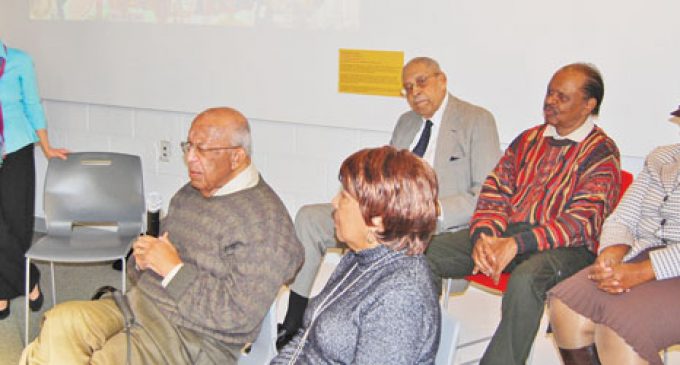Memories of Meharry

Local retired health professionals fondly recall black med school
Photos by Todd Luck. Moderator Linda Dark stands as panelist Dr. Harvey Allen Sr. speaks. Beside him is Treva Oglesby. Seated behind them are (from left) Dr. Willard McCloud, Dr. E. Rudolph Oglesby and Willie Kennedy.
Meharry Medical College in Nashville, Tenn. has trained thousands of black medical professionals since it was founded in 1876. Five of them told their stories last Thursday at the New Winston Museum.
The Society for the Study of Afro-American History sponsored the event, inviting the local retired medical professionals to talk about their time at the esteemed college. They all attended during segregation. Dr. E. Rudolph Oglesby, a retired dentist, said back then blacks who wanted a career in health headed either to Meharry or Howard University in Washington, D.C.
“The reason I went to Meharry: It sounded sort of mystique,” said Dr. Oglesby, to which his wife, Meharry-trained nurse Treva Oglesby, added, “They had a wonderful tradition.”
The Oglesbys were joined by surgeon Dr. Harvey Allen Sr.; nurse Willie Kennedy, who met her husband, Dr. Charles Kennedy, at Meharry; and Dr. Willard McCloud, who practiced general surgery, obstetrics and gynecology.
Meharry’s storied roots go back to the 1820s when a white teenager, Samuel Meharry, was hauling salt in Kentucky when his wagon slipped into a muddy ditch. A family of freed slaves gave him food and shelter for the night and helped him get his wagon out of the ditch the next morning. Meharry told them he’d do “something for your race” to repay them for their kindness. In 1876, he and his four brothers gave $30,000 and land to Central Tennessee College’s new Medical Department, which would become known as Meharry Medical College. Today, it’s the country’s largest private historically black health science center, with schools of medicine, dentistry and graduate studies.
“That’s what you call a very special place,” said McCloud, who graduated in 1948.
Kennedy said her instructors were taskmasters who didn’t tolerate tardiness or slack work.
“Now they were tough and tight,” she said. “And I had grown up in a pretty tight household, so it wasn’t that new to me.”
She made time in her busy schedule to meet and get to know her future husband. She described Dr. Kennedy – a well-regarded pediatrician – as a quiet young man who did well at Meharry. They graduated one year apart in the early 60s.
Treva Oglesby had heard there were four men to every one woman at the college when she applied to Meharry, but was warned not to let that distract her.
“Our director of nursing told us, she was very firm, … that if we had any other thoughts on our minds, we might as well forget them; that fellows were there for number one, number two and number three to become physicians or dentists,” she said.
But the Oglesbys still found time to hit it off, graduate in 1957 and eventually marry.
After graduation, black medical professionals faced employment challenges, especially in the Jim Crow South. Kennedy, Allen and McCloud came to Winston-Salem to Katie Bitting Reynolds Memorial Hospital. “Katie B” opened in 1938 after the Twin City Medical Society, whose members included Dr. Allen’s father, Dr. H.T. Allen, petitioned the mayor to let African-Americans have their own hospital. Allen said before then, black patients were treated by white doctors in a segregated wing of the city hospital, which black doctors weren’t allowed in unless “it was on a stretcher.” Katie B closed in 1970.
“(My father) asked the mayor to try to equalize what the black physicians could do compared to the white,” said Allen. “The black doctor couldn’t come to town, go into the hospital and see his patients, no matter what was wrong with them.”
Linda Dark, secretary for the Society for the Study of Afro-American History, moderated the discussion. The society, whose office and archives are located at the museum, regularly sponsors museum events and exhibits that promote local black history. It holds similar programs at festivals and recreation centers as well.
To volunteer or schedule a time to see the archives of the Society, call Linda Dark at 336-765-2284. The New Winston Museum, which is currently featuring an exhibit highlighting the University of North Carolina School of the Arts during its 50th anniversary, is open Monday through Friday from noon to 5 p.m. and Saturday from 10 a.m. to 2 p.m. but is closed today (Thursday) and tomorrow for the holiday. The museum is located at 713 S. Marshall St.













